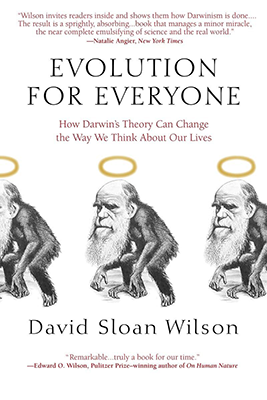Evolution For Everyone
“Evolution for Everyone: How Darwin’s Theory Can Change the Way We Think About Our Lives” is a book written by David Sloan Wilson, a prominent evolutionary biologist and researcher. Published in 2007, the book aims to broaden the understanding and application of Darwinian evolution beyond its traditional domain of biology. Here’s a summary of the key themes and ideas presented in “Evolution for Everyone”:
Introduction to Evolutionary Theory: Wilson begins by explaining the core concepts of evolutionary theory, including natural selection, adaptation, and genetic variation. He emphasizes that evolution is not just a theory about the origin of species but a framework that can be applied to understand human behavior, culture, and society.
Evolutionary Psychology: The book explores how evolutionary principles can explain human psychology and behavior. Wilson discusses topics such as mate selection, parental investment, altruism, cooperation, and aggression through an evolutionary lens. He argues that many aspects of human behavior can be understood as adaptations shaped by natural selection over time.
Evolutionary Medicine: Wilson introduces the field of evolutionary medicine, which applies evolutionary theory to understand health, disease, and medical interventions. He discusses how evolutionary insights can inform strategies for disease prevention, understanding the origins of certain illnesses, and designing more effective treatments.
Evolution and Culture: Wilson explores how cultural evolution interacts with biological evolution. He discusses how cultural practices, beliefs, and norms can evolve and spread through populations, influencing human behavior and societal dynamics. He argues that cultural evolution can be studied using principles similar to those in biological evolution.
Education and Public Policy: Wilson advocates for integrating evolutionary principles into education and public policy. He argues that understanding human behavior through an evolutionary framework can lead to more effective educational strategies, social policies, and solutions to societal challenges.
Critique of Social Darwinism: Wilson critiques the misinterpretations of Darwinian evolution, such as Social Darwinism, which wrongly applied evolutionary principles to justify inequality, racism, and exploitation. He emphasizes the importance of ethical considerations and social responsibility in applying evolutionary insights.
Interdisciplinary Approach: “Evolution for Everyone” promotes an interdisciplinary approach to understanding evolution, encouraging collaboration between biologists, psychologists, anthropologists, sociologists, and other disciplines. Wilson argues that integrating diverse perspectives can enrich our understanding of evolution and its implications for human life.
Overall, “Evolution for Everyone” is a comprehensive exploration of how Darwinian evolution can inform and transform our understanding of human behavior, culture, health, and society. Wilson’s work encourages readers to apply evolutionary principles to everyday life and challenges conventional boundaries of evolutionary theory, demonstrating its relevance across disciplines and domains.

